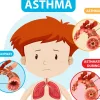What is Asthma?
Asthma is a chronic respiratory condition that affects the airways, making it difficult to breathe. It is a common condition that affects millions of people worldwide, including a significant number in India. Asthma can range from mild to severe and can have a significant impact on a person’s quality of life.
Understanding Asthma
- Definition: Asthma is a chronic inflammatory disease of the airways that causes recurring periods of wheezing, chest tightness, shortness of breath, and coughing.
- Causes: The exact cause of asthma is unknown, but it is believed to be a combination of genetic and environmental factors. Common triggers include allergens (pollen, dust mites, pet dander), respiratory infections, cold air, exercise, and stress.
- Symptoms: Common symptoms of asthma include wheezing (a whistling or squeaky sound when breathing), coughing (especially at night or early in the morning), chest tightness or pain, shortness of breath, and difficulty in breathing.
- Diagnosis: Asthma is diagnosed through a combination of medical history, physical examination, and lung function tests. These tests may include spirometry, peak flow measurements, and allergy tests to identify triggers.
- Types: There are different types of asthma, including allergic asthma (triggered by allergens), non-allergic asthma (triggered by irritants such as smoke or cold air), exercise-induced asthma, and occupational asthma (triggered by workplace exposures).
Managing Asthma
- Medications: Asthma is typically managed using a combination of medications. These may include bronchodilators to relax the muscles around the airways, corticosteroids to reduce inflammation, and long-term control medications to prevent asthma symptoms.
- Lifestyle Modifications: Making certain lifestyle changes can help manage asthma symptoms. These may include avoiding triggers, maintaining a healthy weight, exercising regularly (under medical supervision), managing stress, and quitting smoking.
- Action Plan: It is important for individuals with asthma to have an asthma action plan. This plan outlines what to do in case of an asthma attack, including when to use medications, when to seek emergency care, and how to monitor symptoms.
- Monitoring: Regular monitoring of lung function using a peak flow meter can help individuals with asthma keep track of their symptoms and adjust their treatment accordingly. Regular check-ups with a healthcare provider are also important for managing asthma effectively.
Fitpaa and Asthma Management
While the first half of this blog post focused on providing information about asthma, it is important to note that Fitpaa can also play a role in managing asthma and improving overall respiratory health.
Fitpaa’s personalized approach, backed by AI-driven technology, can help individuals with asthma achieve their health and fitness goals with guaranteed results. By focusing on optimizing metabolism and strengthening the body’s organ systems, Fitpaa can provide a holistic approach to managing asthma.
The Fitpaa app offers features such as a personalized fitness plan, nutrition tracker, workout trainer, and real-time guidance to help individuals follow their Fitpaa Capsule effectively. The app also provides tools for tracking progress, receiving guidance from fitness planners, and connecting with a team of experts including nutritionists and doctors.
While Fitpaa does not claim to be a cure for asthma, it can complement traditional asthma management strategies by promoting overall health and well-being. With its focus on personalized care and guaranteed results, Fitpaa can be a valuable tool for individuals looking to take control of their asthma and achieve their fitness goals.
To experience the benefits of Fitpaa and its comprehensive approach to health and fitness, download the Fitpaa app today and take the first step towards a healthier, fitter life.









